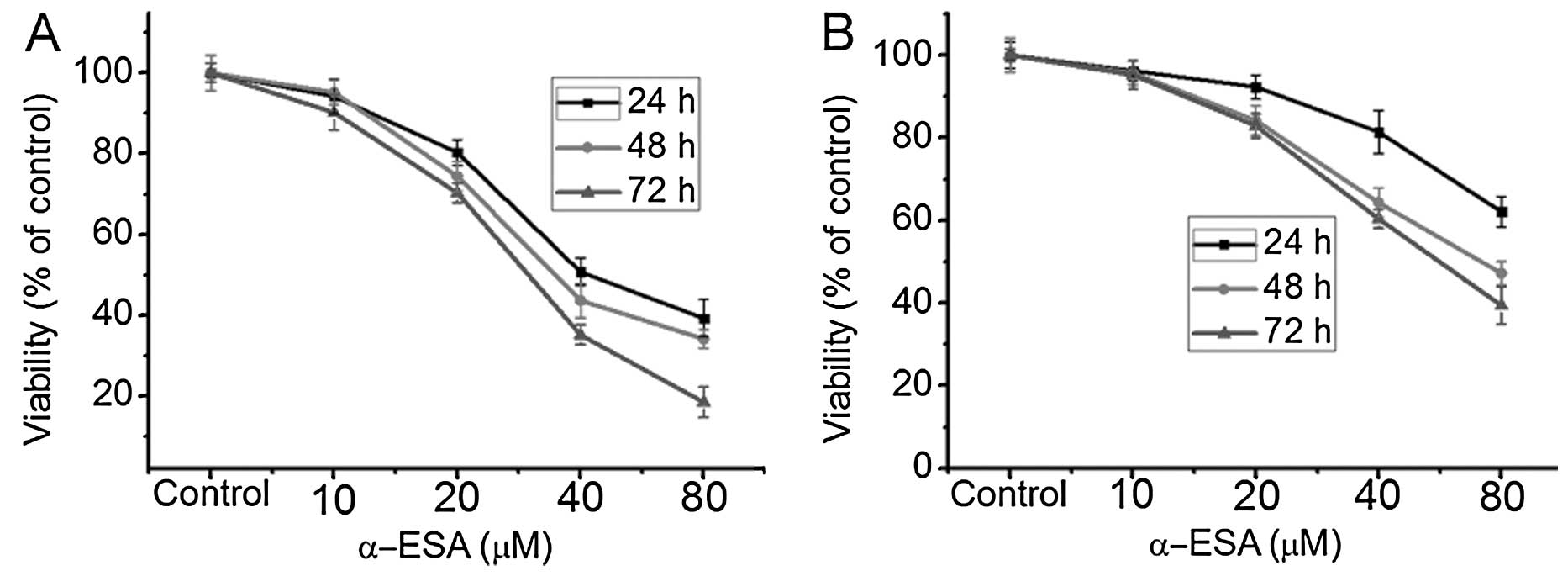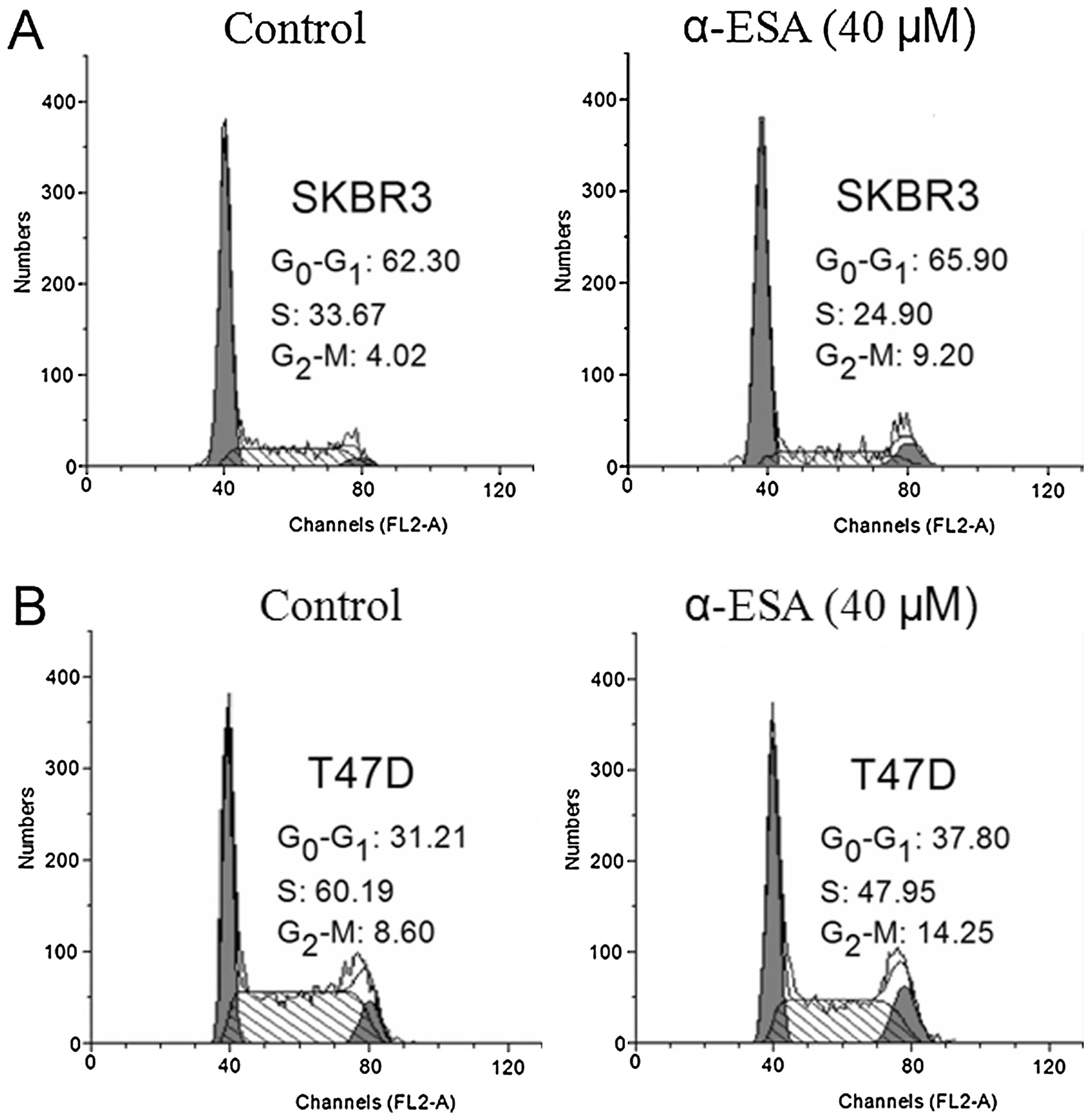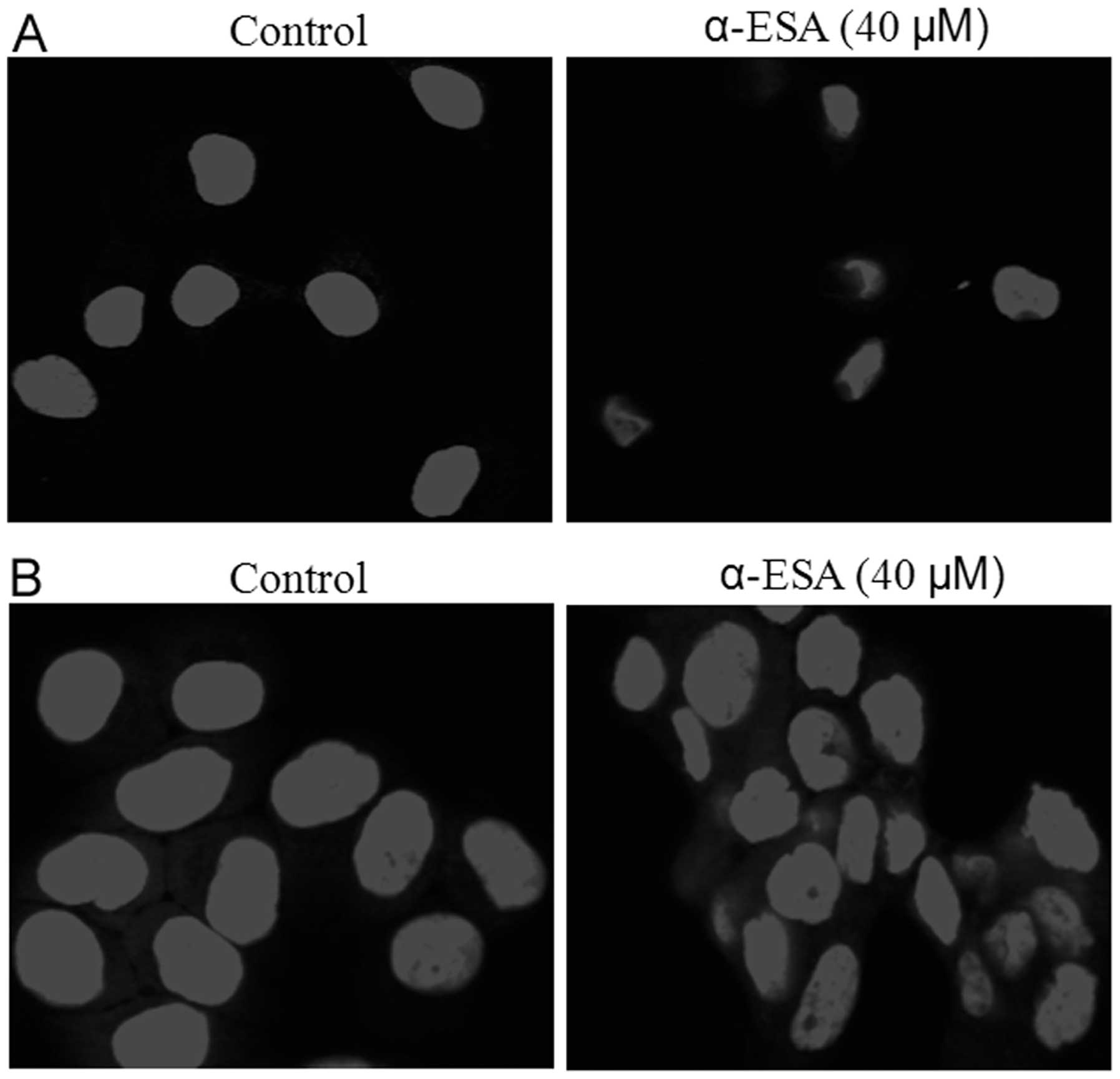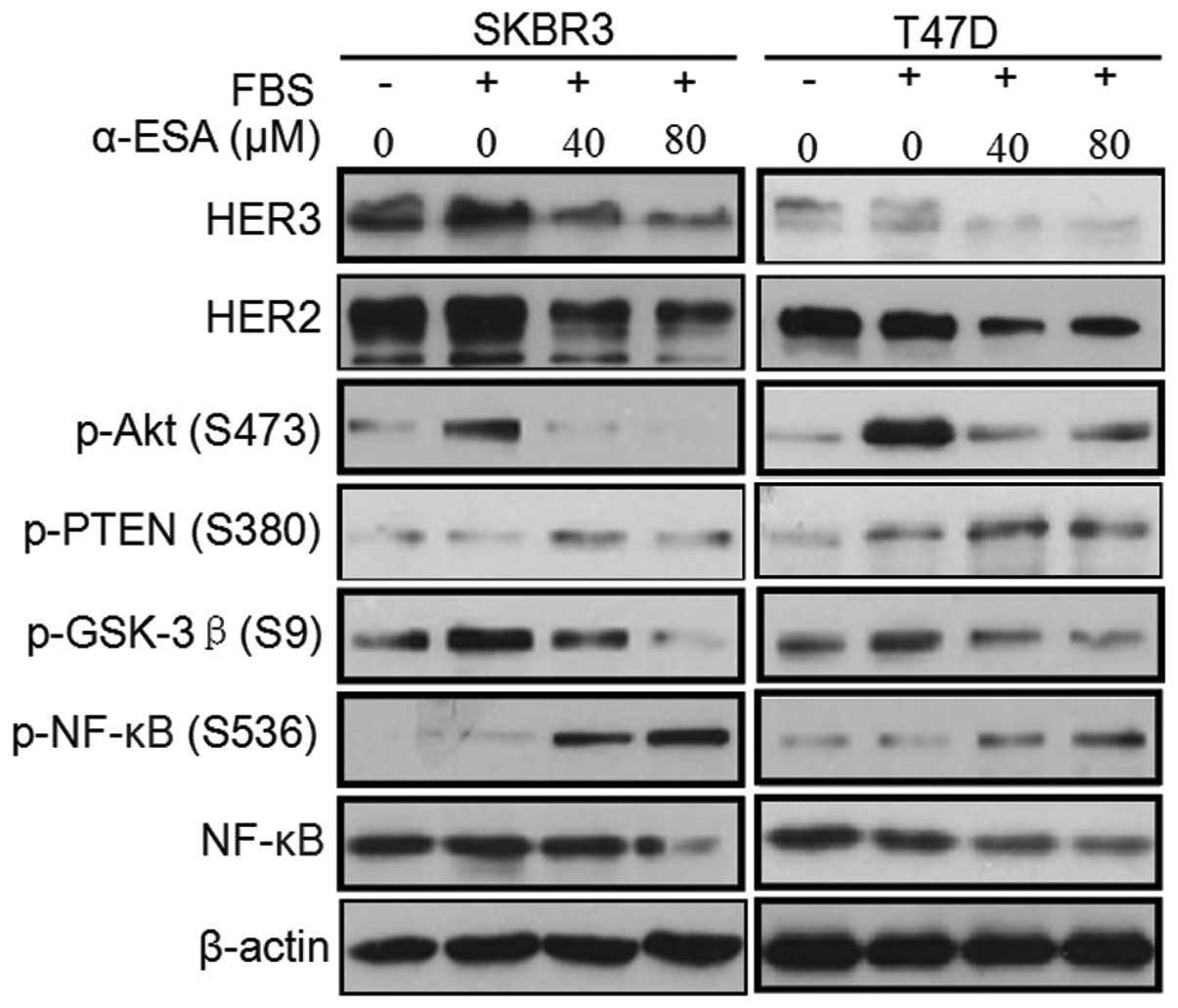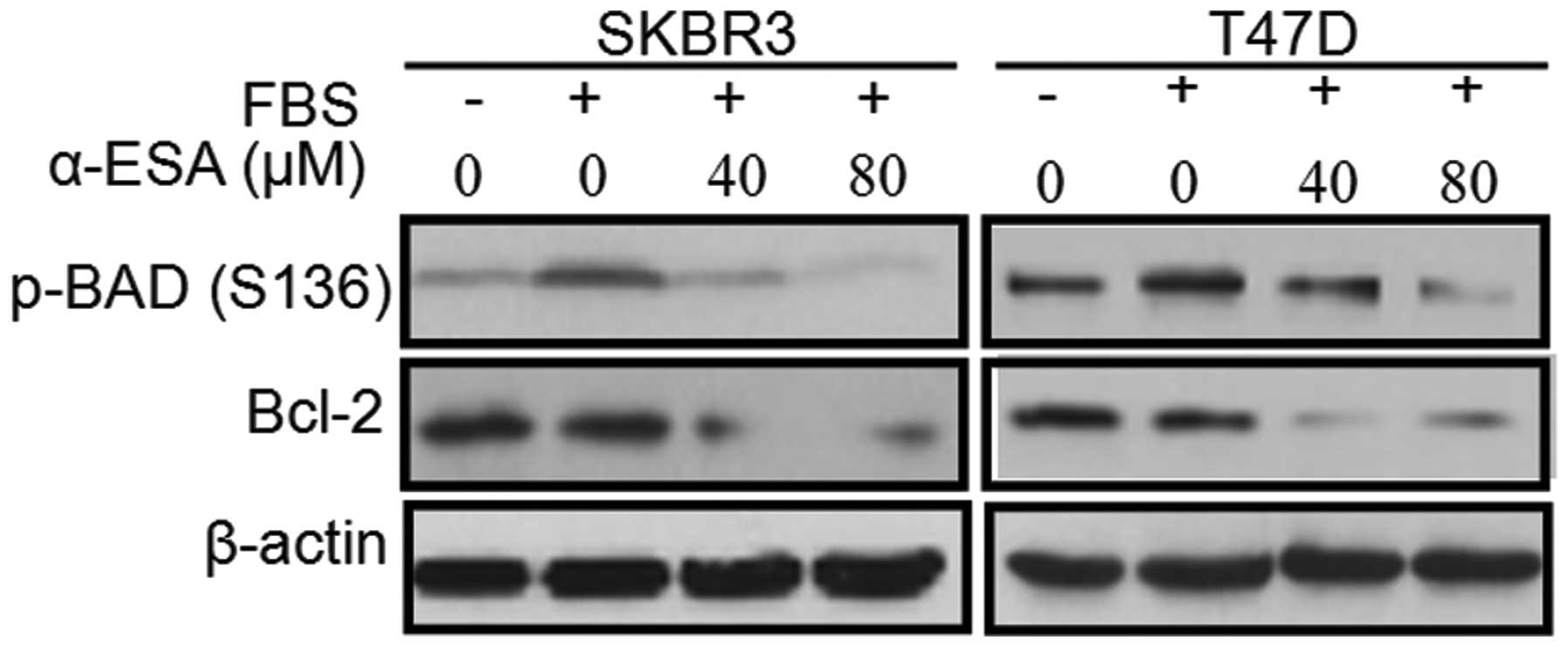|
1
|
Perou CM, Sørlie T, Eisen MB, van de Rijn
M, Jeffrey SS, Rees CA, Pollack JR, Ross DT, Johnsen H, Akslen LA,
et al: Molecular portraits of human breast tumours. Nature.
406:747–752. 2000. View
Article : Google Scholar : PubMed/NCBI
|
|
2
|
Yu D and Hung MC: Role of erbB2 in breast
cancer chemosensitivity. Bioessays. 22:673–680. 2000. View Article : Google Scholar : PubMed/NCBI
|
|
3
|
Hynes NE and Lane HA: ERBB receptors and
cancer: the complexity of targeted inhibitors. Nat Rev Cancer.
5:341–354. 2005. View
Article : Google Scholar : PubMed/NCBI
|
|
4
|
Olayioye MA, Neve RM, Lane HA and Hynes
NE: The ErbB signaling network: receptor heterodimerization in
development and cancer. EMBO J. 19:3159–3167. 2000. View Article : Google Scholar : PubMed/NCBI
|
|
5
|
Konecny GE, Pegram MD, Venkatesan N, Finn
R, Yang G, Rahmeh M, Untch M, Rusnak DW, Spehar G, Mullin RJ, et
al: Activity of the dual kinase inhibitor lapatinib (GW572016)
against HER-2-overexpressing and trastuzumab-treated breast cancer
cells. Cancer Res. 66:1630–1639. 2006. View Article : Google Scholar : PubMed/NCBI
|
|
6
|
Smith BL, Chin D, Maltzman W, Crosby K,
Hortobagyi GV and Bacus SS: The efficacy of Herceptin therapies is
influenced by the expression of other erbB receptors, their ligands
and the activation of downstream signalling proteins. Br J Cancer.
91:1190–1194. 2004.PubMed/NCBI
|
|
7
|
Sergina NV, Rausch M, Wang D, Blair J,
Hann B, Shokat KM and Moasser MM: Escape from HER-family tyrosine
kinase inhibitor therapy by the kinase-inactive HER3. Nature.
445:437–441. 2007. View Article : Google Scholar : PubMed/NCBI
|
|
8
|
Ray RB, Raychoudhuri A, Steele R and
Nerurkar P: Bitter melon (Momordica charantia) extract
inhibits breast cancer cell proliferation by modulating cell cycle
regulatory genes and promotes apoptosis. Cancer Res. 70:1925–1931.
2010.PubMed/NCBI
|
|
9
|
Grossmann ME, Mizuno NK, Dammen ML,
Schuster T, Ray A and Cleary MP: Eleostearic acid inhibits breast
cancer proliferation by means of an oxidation-dependent mechanism.
Cancer Prev Res (Phila). 2:879–886. 2009. View Article : Google Scholar : PubMed/NCBI
|
|
10
|
Moon HS, Guo DD, Lee HG, Choi YJ, Kang JS,
Jo K, Eom JM, Yun CH and Cho CS: Alpha-eleostearic acid suppresses
proliferation of MCF-7 breast cancer cells via activation of PPARγ
and inhibition of ERK 1/2. Cancer Sci. 101:396–402. 2010.PubMed/NCBI
|
|
11
|
Zhang T, Gao Y, Mao Y, Zhang Q, Lin C, Lin
P, Zhang J and Wang X: Growth inhibition and apoptotic effect of
alpha-eleostearic acid on human breast cancer cells. J Nat Med.
66:77–84. 2012. View Article : Google Scholar : PubMed/NCBI
|
|
12
|
Dolcet X, Llobet D, Pallares J and
Matias-Guiu X: NF-κB in development and progression of human
cancer. Virchows Arch. 446:475–482. 2005.
|
|
13
|
Datta SR, Dudek H, Tao X, Masters S, Fu H,
Gotoh Y and Greenberg ME: Akt phosphorylation of BAD couples
survival signals to the cell-intrinsic death machinery. Cell.
91:231–241. 1997. View Article : Google Scholar : PubMed/NCBI
|
|
14
|
Dhillon S: Everolimus in combination with
exemestane: a review of its use in the treatment of patients with
postmenopausal hormone receptor-positive, HER2-negative advanced
breast cancer. Drugs. 73:475–485. 2013. View Article : Google Scholar : PubMed/NCBI
|
|
15
|
Jemal A, Siegel R, Ward E, Hao Y, Xu J,
Murray T and Thun MJ: Cancer statistics, 2008. CA Cancer J Clin.
58:71–96. 2008. View Article : Google Scholar
|
|
16
|
Brennan SF, Cantwell MM, Cardwell CR,
Velentzis LS and Woodside JV: Dietary patterns and breast cancer
risk: a systematic review and meta-analysis. Am J Clin Nutr.
91:1294–1302. 2010. View Article : Google Scholar : PubMed/NCBI
|
|
17
|
Montales MT, Rahal OM, Kang J, Rogers TJ,
Prior RL, Wu X and Simmen RC: Repression of mammosphere formation
of human breast cancer cells by soy isoflavone genistein and
blueberry polyphenolic acids suggests diet-mediated targeting of
cancer stem-like/progenitor cells. Carcinogenesis. 33:652–660.
2012. View Article : Google Scholar
|
|
18
|
Tsuzuki T, Tokuyama Y, Igarashi M,
Nakagawa K, Ohsaki Y, Komai M and Miyazawa T: α-eleostearic acid
(9Z11E13E-18:3) is quickly converted to conjugated linoleic acid
(9Z11E-18: ) in rats. J Nutr. 134:2634–2639. 2004.
|
|
19
|
Ru P, Steele R, Nerurkar PV, Phillips N
and Ray RB: Bitter melon extract impairs prostate cancer cell-cycle
progression and delays prostatic intraepithelial neoplasia in TRAMP
model. Cancer Prev Res. 4:2122–2130. 2011. View Article : Google Scholar : PubMed/NCBI
|
|
20
|
Nahta R, Yu D, Hung MC, Hortobagyi GN and
Esteva FJ: Mechanisms of disease: understanding resistance to
HER2-targeted therapy in human breast cancer. Nat Clin Pract Oncol.
3:269–280. 2006. View Article : Google Scholar : PubMed/NCBI
|
|
21
|
Vaught DB, Stanford JC, Young C, Hicks DJ,
Wheeler F, Rinehart C, Sánchez V, Koland J, Muller WJ, Arteaga CL
and Cook RS: HER3 is required for HER2-induced preneoplastic
changes to the breast epithelium and tumor formation. Cancer Res.
72:2672–2682. 2012. View Article : Google Scholar : PubMed/NCBI
|
|
22
|
Menendez JA, Vazquez-Martin A, Ropero S,
Colomer R, Lupu R and Trueta J: HER2 (erbB-2)-targeted effects of
the omega-3 polyunsaturated. Fatty acid α-linolenic acid (ALA; 18:
3n−3) in breast cancer cells: the ‘fat features’ of the
‘Mediterranean diet’ as an ‘anti-HER2 cocktail’. Clin Trans Oncol.
8:812–820. 2006.PubMed/NCBI
|
|
23
|
Carracedo A and Pandolfi PP: The PTEN-PI3K
pathway: of feedbacks and cross-talks. Oncogene. 27:5527–5541.
2008. View Article : Google Scholar : PubMed/NCBI
|
|
24
|
Eom JM, Seo MJ, Baek JY, Chu H, Han SH,
Min TS, Cho CS and Yun CH: Alpha-eleostearic acid induces
autophagy-dependent cell death through targeting AKT/mTOR and
ERK1/2 signal together with the generation of reactive oxygen
species. Biochem Biophys Res Commun. 391:903–908. 2010. View Article : Google Scholar : PubMed/NCBI
|
|
25
|
Draczynska-Lusiak B, Chen YM and Sun AY:
Oxidized lipoproteins activate NF-kappaB binding activity and
apoptosis in PC12 cells. Neuroreport. 9:527–532. 1998. View Article : Google Scholar : PubMed/NCBI
|















